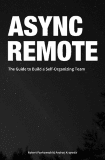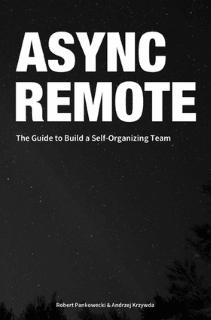Last Update:
Async Remote Book Review

Table of Contents
As you might already know, I work remotely. That’s why I try to follow and read guidelines/articles that relate to that style of working. Recently, I got very curious when I saw a new book called “Async Remote” from the Arkency team. Let’s see what it offers.
Warning: the book is not only about remote! :)
Disclaimer: The idea and all the content here is written on my own, but I asked the authors for a free version of the book (and I received it).
The book
The authors: Robert Pankowecki (@pankowecki) and Andrzej Krzywda (@andrzejkrzywda)
The structure
- Story of size 1
- Forget about sprints
- Stream Of Work
- Chronos vs. Kairos
The above chapters present a good flow of work in a project. How to split tasks, how to increase developer morale by using small tasks, how to maintain the backlog and new tasks. “Take the first task rule.”
- Can developers be project managers?
- Developer’s attitude
- Customers Meetings
- Developers creating tickets
- Specification as floating ticket
- Working with tickets
- Start from the middle
- Communication as tickets
Management stuff: mixing roles between devs and managers, working with clients, collecting requirements.
- Over-Communication
- On async
- Knowledge sharing
- Standups and meetings
How to communicate effectively in the async world, when you work remotely.
- Tooling
- Friendly workflow environment
Tools, tests, continuous integration,
- Bonuses
My view
I enjoyed ‘Async Remote‘! It’s written in a good, fresh style. The authors do have the experience; they know what they are writing about. Although the content is sometimes heavy - like project management, the book talks about it in an easy to grasp method.
I only worry that the presented approach is sometimes too idealistic and it’s not easy to apply it in all environments. If you have a small team of people without much of legacy style of management, then there’s some hope of course.
5 Things that I should consider in my current work style:
- Split tasks into smaller ones. I tend to work on larger, sometimes
even not well-specified tickets. Now I understand why it’s important
to be able to take smaller steps at a time.
- People like to tick something off as quickly as possible. If you have some long task, you don’t see much progress then your motivation might drop.
- ‘Take the first task’ - assuming the tickets are in a proper order it’s vital to focus on the first one from the list. I like to take the least important (but probably easy to fix) and do it! :) I have something to tick off, but did it create any value? probably not…
- ‘Start from the middle’ approach - an interesting idea that makes
you focus on the most important part and skip the other areas. As
always it’s easy to work on the basic stuff and defer the real work.
If you start doing the core part, there’s a higher chance you’ll
progress quicker.
- BTW: this can be applied even to blog posts! Think about the core part of the article, the real meat.
- Over-communication and being proactive - another vital part of working remotely. It’s much better to write a bit more mails/comments than not have a clear spec to follow.
- Experiment with tools and techniques: async standups/meetings, knowledge sharing, Slack.
Summary
Final mark: 4/5
Async Remote is a good book that covers a lot of topics relevant to remote people. Depending on what you prefer: project management, self-management, tools - you’ll find something for yourself. As I mentioned in the intro, it’s not only for remote projects - if you work in a corporate environment you can still benefit from the content. I’d say that everyone that uses some Agile approach will find something for himself.
Pros:
- Not only about remote
- Easy to read, small chapters
- Practical knowledge and proven techniques
- The authors have a real experience
- Lots of psychological advice
- For example “I have so much to do and so little time and the
time is just
passing by…” vs “I have 2 hours of my time, what is the best way I can use it?”
- For example “I have so much to do and so little time and the
time is just
Cons:
- Minor: Feels like a bunch of selected (but polished) essays so not as ‘professional’ as a larger book. Maybe there will be a second version that would go much deeper?
Have you read the book? What’s your opinion about it?
What’s your favorite book on the similar topic?
I've prepared a valuable bonus for you!
Learn all major features of recent C++ Standards on my Reference Cards!
Check it out here:


